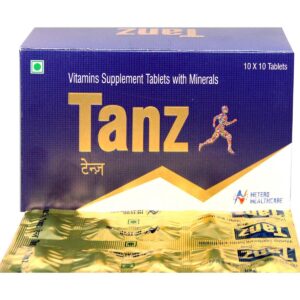Vitamin C + VITAMIN E
Vitamin C: Drug Name: Vitamin C
Use: Vitamin C, also known as ascorbic acid, is a water-soluble vitamin that is essential for normal growth and development. It is commonly used to prevent or treat vitamin C deficiency in individuals who do not consume enough vitamin C-rich foods in their diet. It is also used as a dietary supplement to boost the immune system, improve iron absorption, and promote overall health.
Mechanism of Action: Vitamin C acts as an antioxidant, protecting cells from damage caused by free radicals. It plays a crucial role in the synthesis of collagen, a protein essential for the formation of connective tissues, wound healing, and maintenance of healthy skin, blood vessels, bones, and teeth. Moreover, vitamin C enhances the absorption of iron from plant-based foods and helps in the conversion of folate to its active form.
Dose: The recommended daily intake of vitamin C varies with age, sex, and specific health conditions. For adults, the recommended dietary allowance (RDA) is generally 75-90 mg for women and 90-120 mg for men. However, in certain cases, higher doses up to 2000 mg per day may be recommended, such as in smokers, pregnant women, or individuals with conditions like malabsorption or increased oxidative stress.
Side Effects: Vitamin C is generally considered safe when taken within the recommended doses. However, high doses exceeding 2000 mg per day can lead to gastrointestinal side effects such as diarrhea, stomach cramps, and nausea. Individuals with a history of kidney stones or kidney disorders should exercise caution while taking high doses of vitamin C, as it may increase the risk of kidney stone formation. Allergic reactions to vitamin C supplements are rare but can occur in some individuals. It is important to consult with a healthcare professional before starting any new supplement to determine the appropriate dosage for individual needs and to discuss any potential interactions with other medications.
Vitamin E: Vitamin E is a fat-soluble vitamin that is essential for the functioning of the body. It is available as a supplement and is naturally present in various foods such as nuts, seeds, and vegetable oils.
Use:
Vitamin E is primarily used as a dietary supplement to prevent or treat vitamin E deficiency. It is also used in some medical conditions such as cystic fibrosis, liver disease, and certain types of anemia. Additionally, it is sometimes used topically for skin conditions like acne and scars.
Mechanism of action:
Vitamin E acts as an antioxidant in the body, which means it helps to protect cells from damage caused by harmful molecules called free radicals. It also plays a role in the functioning of the immune system, cell signaling, and gene expression.
Dose:
The recommended dietary intake of Vitamin E varies depending on age and sex. For adults, the recommended daily allowance (RDA) ranges from 15-19 milligrams (mg) per day. Higher doses may be required in certain medical conditions, under the guidance of a healthcare professional.
Side Effects:
Vitamin E is generally considered safe when taken within the recommended dietary intake. However, high doses of vitamin E supplements may increase the risk of bleeding, especially in individuals taking blood-thinning medications. Some individuals may also experience gastrointestinal symptoms such as nausea, diarrhea, or stomach cramps. In rare cases, hypersensitivity reactions or allergic dermatitis may occur. It is important to consult with a healthcare professional before starting any new vitamin E supplement.

